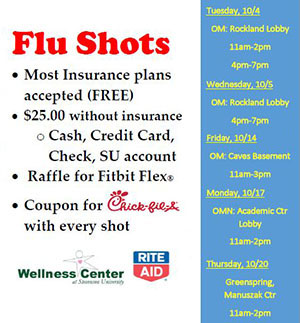Flu season is nearly here, and it’s time to take precautions to avoid the virus.
The flu, or influenza, is a severe infectious disease of the respiratory system caused by a virus. There are two flu types that spread through humans; type A and type B. Both types cause flu epidemics each year, according to the Centers for Disease Control and Prevention (CDC). Flu viruses occur year-round in the United States, but are most common during the fall and winter. The CDC adds, “Influenza activity often begins to increase in October… and peaks between December and March, although activity can last as late as May.”
Certain people have a higher risk of contracting the flu virus such as young children, the elderly, and those with chronic health problems. The first symptoms that show are fevers/chills, cough, sore throat, runny or stuffy nose, headaches, fatigue, and vomiting and diarrhea; though the latter are more common in children than adults, according to the CDC.

THE VIRUS IS CONTAGIOUS
The virus is spread when people sneeze, cough, and talk to each other in a close proximity. Brenda Boggs, a nurse in Stevenson’s Wellness Center, explained that it is important to know that people are contagious at least one day before they show any symptoms, so they can spread the virus to others without even knowing they have the flu. Even after they come down with the illness, they are contagious for about a week.
According to Boggs, “Most people who contract the flu virus will be down for 5 -7 days and should be in bed recovering,” adding that this is not an illness to be taken lightly. “Thousands of people die each year in the United States from the flu virus or are hospitalized and taken to the ICU,” she said. According to the CDC, the flu can trigger serious complications such as inflammation of the heart, brain or muscle tissues, and multi-organ failure (for example, respiratory and kidney failure).
Boggs advised that people at risk should get a flu shot and wash their hands to lessen their chances of contracting the flu virus. If, however, somebody contracts the flu, they can seek antiviral medicine such as Tamiflu®, to help fight off the symptoms. Stay away from others, drink lots of fluid, try to maintain a normal diet, and get plenty of rest.
Flu shots will be available on campus starting Oct. 4 in the Rockland Lobby. Most insurance plans will be accepted.


























































